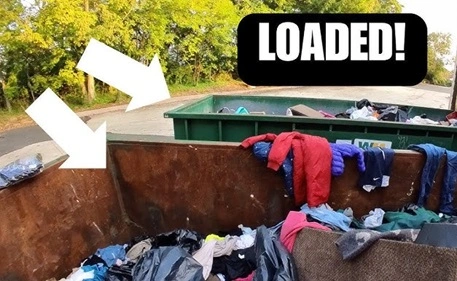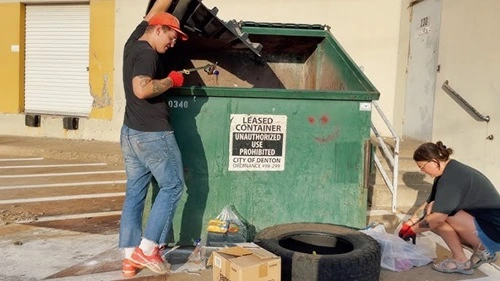Yes, it is generally illegal to dumpster dive at Goodwill locations, as the practice often violates trespassing, theft, and local sanitation laws. While dumpster diving is not specifically prohibited under federal law, the act of scavenging through private property, such as a Goodwill dumpster, is restricted by various state and local regulations. Goodwill and similar organizations have policies in place to discourage the practice for safety, legal, and ethical reasons.
Understanding Dumpster Diving and Its Legal Implications
Dumpster diving refers to salvaging discarded items from dumpsters or trash bins, often in search of usable goods. Although some see it as a way to repurpose waste or save money, diving into dumpsters at Goodwill or other retail outlets can lead to legal consequences.
1. Laws That Apply to Dumpster Diving at Goodwill
Trespassing Laws
Goodwill dumpsters are typically located on private property, which means accessing them without permission constitutes trespassing.
- Example: Under California Penal Code § 602, entering private property without authorization is classified as trespassing, which can result in fines or misdemeanor charges.
- Dumpsters that are fenced off, locked, or clearly marked with “No Trespassing” signs strengthen the legal basis for a trespassing charge.
Theft Laws
Items discarded in Goodwill dumpsters may still be considered the property of the organization until officially disposed of. Taking these items without permission can be classified as theft.
- Example: In Texas, theft is defined under Penal Code § 31.03, which prohibits taking items belonging to another without consent.
Littering or Sanitation Laws
Dumpster diving can create a mess if items are scattered outside the dumpster, potentially violating local littering or sanitation ordinances.
- Example: Many municipalities enforce strict cleanup requirements and can fine individuals for creating public nuisances near commercial dumpsters.
2. Goodwill Policies on Dumpster Diving
Goodwill has explicit policies prohibiting dumpster diving for several reasons:
1. Safety Concerns: Items in dumpsters may include hazardous materials, broken glass, or unsafe items that can cause injury.
2. Property Rights: Even discarded items remain Goodwill’s property until they are transported to designated disposal sites.
3. Operational Integrity: Goodwill relies on selling donated items to fund its charitable programs. Allowing scavenging could undercut these efforts.
3. Penalties for Dumpster Diving at Goodwill
The consequences of dumpster diving at Goodwill vary depending on the jurisdiction and the actions taken by the organization or law enforcement:
1. Warnings: First-time offenders are often issued verbal or written warnings.
2. Fines: Municipal fines for trespassing or littering can range from $50 to $500.
3. Arrest or Criminal Charges: Repeat offenses or refusal to leave private property may lead to misdemeanor trespassing or theft charges, which can result in court appearances, community service, or jail time.
Ethical and Practical Considerations
Even if dumpster diving at Goodwill does not result in immediate legal action, ethical concerns remain:
1. Impact on Charitable Programs: Goodwill uses revenue from sold donations to support job training and community services. Removing items from dumpsters deprives the organization of potential income.
2. Sanitation Risks: Dumpsters often contain unsanitary or hazardous materials, posing health risks to divers.
Legal Alternatives to Dumpster Diving
Instead of dumpster diving, consider these alternatives:
1. Visit Clearance Sections: Goodwill often discounts items significantly before disposing of them, making them affordable without legal risk.
2. Attend Community Free Markets: Some communities host free events or giveaways for unwanted items.
3. Ask for Permission: If you’re interested in salvaging items, seek permission from the store manager or property owner.
Recent Legal Updates
1. Increased Enforcement Against Trespassing
Cities like Los Angeles and Chicago have stepped up enforcement of trespassing laws near retail dumpsters due to complaints of property damage and sanitation issues.
2. Donation Policies
Goodwill has implemented stricter guidelines on disposing of unsellable items, including transporting unusable goods directly to recycling or waste facilities, limiting what is left in dumpsters.
3. Public Education Campaigns
Organizations like Goodwill and the EPA are encouraging proper recycling and reuse to reduce waste without resorting to dumpster diving.
FAQs About Dumpster Diving at Goodwill
Q1. Is dumpster diving illegal at all Goodwill locations?
Ans: Yes, most Goodwill locations consider dumpster diving trespassing and may involve law enforcement if individuals are caught.
Q2. Can I take items from a Goodwill dumpster if there are no “No Trespassing” signs?
Ans: Even if signs are absent, dumpsters on private property are generally off-limits without permission, and taking items could still be considered theft.
Q3. Are there safer alternatives to dumpster diving?
Ans: Yes, purchasing items from clearance racks, visiting thrift stores, or attending community exchanges are legal and safer alternatives.
Q4. What happens if I’m caught dumpster diving at Goodwill?
Ans: Consequences vary but may include a warning, fines, or legal charges for trespassing or theft.
Q5. Why does Goodwill throw items away?
Ans: Goodwill discards items that are unsellable, damaged, or hazardous. However, the organization often prioritizes recycling or donating to other charities when possible.


